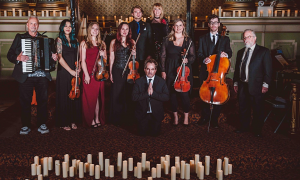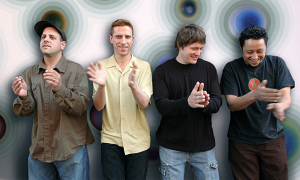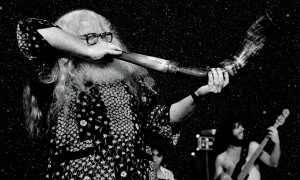Home » Jazz Articles » From the Inside Out » One Day in Brazil, 50 Years in Germany
One Day in Brazil, 50 Years in Germany
 Tony Adamo
Tony AdamoWas Out Jazz Zone Mad
Ropeadope
2018
Some African cultures preserved their history not by the written but by the spoken word, kept by oral cultural historians known as griots. On Was Out Jazz Zone Mad, vocalist Tony Adamo aspires to serve in this same role, as a verbal historian of both official and unofficial African-American jazz and blues culture. This type of jazz jive might wear quickly thin but Adamo writes about jazz and jazz musicians with such detailed intimacy and vision that his words snap, crackle and pop. More often than not, the heart, mind, and soul of Was Out Jazz Zone Mad prove genuine.
It helps immeasurably that Adamo regales such tales in the company of musicians expert in organ-guitar combo, small-club, greasy instrumental funk, led by drummer Mike Clark of (Herbie Hancock and) the The Headhunters and featuring drummer Lenny White, organist Mike LeDonne, percussionist Bill Summers, guitarists Elias Lucero and Jack Wilkins, and saxophonist Donald Harrison. Their grooves are low-down and for real funky in the best possible way.
Thus inspired, Adamo's lyrical material is often magisterial. His description of saxophonist Joe "Sonic Henderson" cuts as sharp and bright and quick as lightning, and crosses from writing about jazz into writing that IS jazz: "Always diggin' into the hot-cool vocabulary of jazz to come up with notes that aren't always obvious but always fit...floating, thought-provoking sounds that were at times hard liquor jazz mixed with mad sex music..." All the while, this set's core trio—drummer Clark, LeDonne on organ, and guitarist Wilkins—twist up the accompaniment in thick rhythmic knots, with Wilkins playing Melvin Sparks to LeDonne's Charles Earland in their respective solos.
"Gale Blowin' High" honors jazz activist and trumpeter Eddie Gale. Saxophone and trumpet help create a fuller, larger ensemble sound very much like late-1960s recordings by Sun Ra and his Arkestra, Pharoah Sanders or like-minded wayfarers. Exploratory solos by Harrison (suggesting Sanders on alto), Wolff (suggesting Ra on piano) and White (suggesting no one but himself) pull and poke at the edges of this tune alongside Adamo's restless vocal.
In "Too Funky to Flush," Adamo unravels the best jazz tale of them all—the story of the city of New Orleans. Standing hip deep awash in a trio groove that's as deep and broad and powerful as the mighty Mississippi River, he sings the praises of Dr. John, Professor Longhair, Irving Mayfield and other denizens of the Crescent City's musical pantheon. (A local soul food kitchen's lunch and dinner menu specials make surprisingly good lyrics, too.)
 Aguanko
AguankoPattern Recognition
Self Produced
2018
Aguanko's composer, conguero and bandleader Dr. Alberto Nacif first stepped into the worlds of Latin and Afro-Cuban percussion alongside Cuban conga/bongo master Armando Peraza, the pillar of percussion fire who blazed throughout the Santana band's first decade. On Pattern Recognition, Nacif teams with another legendary Cuban percussionist: José "Pepe" Espinosa, who jumps in on timbales, guiro and bongos, and doubles as producer of Aguanko's third release.
Aguanko's albums consistently run with the humming, precision consistency of an exquisitely tuned timepiece, and Pattern Recognition is no exception. The opening "Señor Smoke" (mambo) organically blossoms from its introductory bass line, trailing piano, percussion, bass and drum lines all in perfect balance, with horns emerging like flowers blooming off of their rhythmic vines. Muted trumpet sketches a classic Latin big band sound into the subsequent title track (also a mambo).
"Doctor's Orders" (mambo) spotlights extended Latin jazz reflections from pianist Rick Roe and trombone player Christopher Smith, and winks at Dr. Nacif's "other" profession as a family practitioner who earned his MD from Wayne State University and served as personal physician to Detroit's esteemed trumpeter Marcus Belgrave. "Metaphorically Speaking" (mambo) burns with even more jazz fever from exhilarating trumpet and trombone solos (and is curiously annotated as Nacif's nod to Charlie Parker's incendiary romp through the Tin Pan Alley classic "[Back Home Again in] Indiana").
In fact, it's tempting to wonder if Pattern Recogntion runs a little too smoothly. Running together five mambos out of the first six tracks (no matter how excellently conceived and executed) can create a sonic sameness that sparkles and shines but rolls past without pause or differentiation. Even so, it's a comfortable glide along colorful, beautiful sights and sounds through the kaleidoscopic vision of southeastern Michigan's beacon of Latin jazz heat and light.
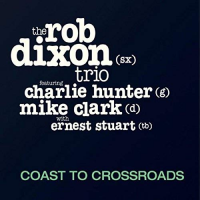 Rob Dixon
Rob DixonCoast to Crossroads
Self Produced
2018
"The album is called Coast to Crossroads because I'm based in Indiana, the Crossroads state, but I also work a lot on the West Coast and East Coast," explains saxophonist Rob Dixon, who leads this trio session with drummer Mike Clark and seven-string funk guitar maven Charlie Hunter (who also served as producer), plus occasional guest trombonist Ernest Stuart.
Personal connections between the three principals enable their musical connections to flow richly and deep: Indianapolis Jazz Hall of Famer Dixon played saxophone for guitarist Hunter on three different tours, and for Clark on the drummer's 2010 solo album Carnival of Soul (Owl) plus the The Headhunters' album released the following year, Platinum (Owl). Dixon's pals provide a serious rhythmic wallop. Hunter plucks layer after layer of funk from the bottom two of his seven-stringed guitar, and Dixon once described Clark thusly: "Nobody can play funk like him and nobody can play a shuffle like him."
Fans of classic Houston Person, Junior Walker and King Curtis will thoroughly enjoy this romp through feel-good, gutsy rhythm and blues. Seething deep rhythms kick off "Yo" slinky and hot, with Dixon honoring these titans not only in his soulful horn sound but in its sharp attack, which stabs into then dances away from the beat. Clark approximates Bernard Purdie with his snare rolls and cymbal pops, stretching the boogaloo beat into the 21st century, while Hunter's guitar radiates thick gooey chords that sound like a Hammond B-3.
Annotator Bill Milkowski notes that trombonist Ernest Stuart plays "Fred Wesley to Dixon's Pee Wee Ellis" in the loping blues "Millions" and in "San Leando," where Stuart's trombone doubles Dixon's funky sax melody in thick blue-colored lines.
But Dixon's two covers blow Coast to Crossroads completely off the map. His saxophone cuts as quick and dapper as Terrence Trent D'Arby's original soulful vocal on "Wishing Well," the number one pop hit from D'Arby's 1987 Columbia debut; and his slow-burning arrangement stomps "California Love" (written by Dr. Dre, Tupac Shakur and Roger Troutman for Shakur's 1996 monster All Eyez on Me [Death Row]) into a bump and grinding blues.
Dixon draws the closing curtain with a romantic, unaccompanied solo reflection of the dreamy "It Could Happen to You."
 Amaro Freitas
Amaro FreitasRasif
Far Out Records
2018
In the small coastal city of Recife, in the Brazilian state of Pernambuco, Amaro Freitas began playing piano in his local church at age 12. A few years later, the jazz gods intervened in the form of a Chick Corea concert DVD. "He completely blew my mind," Freitas once recalled. "I'd never seen anything like it but I knew that's what I wanted to do with a piano." The refocused Freitas became resident pianist at Brazil's legendary jazz bar Mingus before his 23rd birthday.
Rasif is Freitas' love letter to (and a colloquial spelling of) his hometown, but the name of that jazz bar looms much larger than the name of his hometown over his second release. It captures Freitas' profoundly rhythmic and percussive piano playing to grand effect. But Rasif also presents a program of powerful originals, thunderous and soulful and thick with all the harmonic, rhythmic, emotional and spiritual complications of life, entirely spoken in blues and jazz and gospel but put together into a new language—just like the music written by the namesake of that Brazilian jazz bar.
For example, "Trupé" opens in resonant percussion, a tribal sound that (double) bassist Jean Elton carves into a merciless circular riff; Freitas' piano enters by splashing colorful notes on top of their rhythm like drops of impressionist paint; bass and piano twirl from counterpointing to doubling and then splash into a Spanish dance. The end of "Trupé" sounds less like a closing and more like the trio finally caught and wrestled its ferocious music to the ground.
"Aurora" represents the sun's single-day journey in a three-part suite that begins lightly and ends slowly but burns in the middle, all clearing space for Freitas' more melodic side to shine through. The title track honors and reflects the natural beauty of his native Brazil, with his piano first cascading from note to note like a butterfly, then shifting into strummed chords that nearly sound like a harp accompanying the bassist, all rendered in a very warm and welcoming touch.
Freitas is an amazing rhythm pianist throughout. "Dona Eni," his reconstruction of Brazil's baião rhythm, jackhammers an impossible beat until it finishes by slamming headlong into the solid brick wall of its closing chord, and it seems impossible to fully describe or explain his flurry of bass and midrange tones that blanket "Mantra" thick and heavy.
Rasif is not jazz piano trio music. It IS music from a three-piece led by piano, but Freitas' vision writes this small ensemble into much bigger sound. His stern form and romantic purpose in "Plenilunio" strongly suggest Rachmaninoff but then loosen like a balloon that floats into a Brazilian jungle and ends in a tropical thunderstorm. Charles Mingus would appreciate this journey, and the courage to take it.
 Various Artists
Various ArtistsMPS: 50 Years
MPS
2018
In 2018, MPS—Musik Produktion Schwarzwald—Records, Germany's first jazz label, celebrated its fiftieth anniversary. Pianist Oscar Peterson recorded the first release for MPS after his contract with Verve expired. Its catalog expanded to feature George Duke, Red Garland, Wolfgang Dauner, Horst Jankowski, George Shearing, Monty Alexander and many other pianists. Violin became the label's second most featured instrument through releases by established masters such as Don "Sugarcane" Harris and Stephane Grappelli, and emerging ones such as Didier Lockwood and Jean-Luc Ponty.
Have you ever been in the mood when you turned on the television not to watch anything specific but to scroll through the channels to see what different things were on? Jazz compilations are great for that kind of mood. Because it offers an abundance of jazz styles—from Brazilian to hard-bop, from large ensembles to solo guitarists—this one is better than most.
You can spin through MPS: 50 Years to catch first-rate performances by first-ballot jazz hall of famers. Joe Henderson sears "Blues for Liebestraum" from the inside out and from the outside in, trailing some amazing rhythm aces (pianist Chick Corea, bassist Ron Carter and drummer Billy Higgins) in tow. Elvin Jones Jazz Machine's "Little Lady" showcases soprano and tenor sax soloists Michael Stuart and Pat LaBarbera through a tender blues that wraps her in mysterious oriental veils, strongly suggesting John Coltrane's fascination with eastern scales and spiritualism. Speaking of Coltrane, "Afro Black" from Nicola Conte & Spiritual Galaxy seems to honor/counterpoint his classic version of "Afro Blue."
As his trumpet plays cat and mouse with its opening lines, you get a pass if you mistake Freddie Hubbard's "Blues for Duane" for a late-1950s Miles Davis track. Drawn from Hubbard's exceptional 1969 acoustic recording The Hub of Hubbard with Roland Hanna (piano), Richard Davis (bass), Louis Hayes (drums) and Eddie Daniels (tenor sax), "Duane" presents Hubbard at the peak of his powers as he soars to the top of his range as if gravity doesn't exist, then swivel-hips back down to dance once more with the melody.
Spin again to hear different approaches to the guitar, from "Piano na Mangueira" (played on the Brazilian choro [mandolin] by Hamilton de Holanda) to Baden Powell's airy "O Astronauta" to Joe Pass' surprising Latin rock romp with bassist Eberhard Weber through "Ode to Billy Joe."
Keep spinning. You might discover artists you wish you knew more about. I sure did.
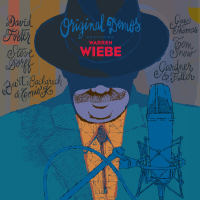 Warren Wiebe
Warren WiebeOriginal Demos
Contante & Sonate
2018
From the accounts of nearly everyone who heard him, Warren Wiebe was "a singer's singer." After kicking around in several bands between his native San Diego and Los Angeles, songwriters Burt Bacharach and David Foster ran across Wiebe's pure tone and apparently effortless range, and Wiebe became the go-to demo singer for many of southern California's most successful songwriters. "We were kind of like Edger Bergin and Charlie McCarthy, only I was the dummy and Warren made me come alive onstage," Foster reflected after Wiebe's 1998 passing.
But the downside of "a singer's singer" is that few people outside the songwriting industry got to hear Warren Wiebe sing. He sang backup on many others' hit records. He sang a charming duet with Gloria Estefan ("Is It Love That We're Missing") on Quincy Jones' landmark Q's Jook Joint (1995, Qwest). He sang at Celine Dion's wedding, and at the funeral for US Congressman Sonny Bono. But Wiebe didn't write his own original music and never released an album of his own.
Warren Wiebe: Original Demos, released in 2018 in a limited edition of 1000 numbered units, fills this gap with brilliance and heart. Containing previously unreleased music written and performed by Foster, Bacharach, Tom Snow and many others, it celebrates both Wiebe's vocal prowess and his memory. One of its most compelling features is the companion booklet which features composer's notes on each tune along with this love note from Contante & Sonate head executive Gabriel Raya: "Warren Wiebe wasn't just gifted with the most gorgeous voice imaginable. He had that essential ingredient which makes a singer unique: soul."
Foster shares a telling memory in his notes to "The Colour Of My Love," which Celine Dion recorded as the title track for her 1993 (Epic) release. After listening to Wiebe's demo version, Foster writes, she told the composer, "I can't sing that song after that man; he has the most incredible voice I have ever heard." That voice is powerfully clear and clean and crisp and sweet, like the succulent first bite of some heavenly fruit, in this "demonstration" performance.
Wiebe's voice finds and fills every nuance of every note behind every word in Bacharach's "Never Take That Chance Again" (co-written with Tonio K.) like musical honey. It climbs this melody, including Bacharach's trademark melancholic yet hopeful horns, and then soars off the peak of its chorus into powerful and potent soul pop balladry. (Diane Schuur recorded this for her Friends for Schuur album [Concord Jazz, 2000].)
Tim Feehan wrote "Make A Wish" for the public competition to write the official song for Canada's 125th anniversary in 1992, and it brings a sparkling and cheery conclusion to this bright songfest. You can nearly hear Wiebe's voice smile as it dances and leaps over lyrics so hopeful and full of promise. If only we could "Make A Wish" to hear Warren Wiebe sing once more.
Tracks and Personnel:
Was Out Jazz Zone Mad
Tracks: Rain Man; Sonic Henderson; B.B. Kings Blues on Fire; Birth of The Cool; General T.; Boogaloo the Funky Beat; Card Dealer; Gale Blowin' High; Too Funky to Flush; Jax Bulldog Priest; I'm Out the Door; Let The Devil Pay My Way; Fly Jump or Die.
Personnel: Tony Adamo: vocals, spoken word; Mike Clark: drums; Donald Harrison: saxophone; Bill Summers: percussion; Lenny White: drums; Michael Wolff: piano; Richie Goods: bass; Tim Ouimette: trumpet; Mike LeDonne: organ; Jack Wilkins: guitar; Delbert Bump: organ; Elias Lucero: guitar; Roger Smith: keyboards; Kyron Kirby: drums; Wayne De La Cruz: organ; Chris Pimentel: guitar; Vince Littleton: drums.
Pattern Recognition
Tracks: Señor Smoke; Pattern Recognition; Re-Vision; Doctor's Orders; Los Niños; Metaphorically Speaking; Mojo Mohito; Noche Y Luna; Corazon Suave; Late Night Religion.
Personnel: Alberto Nacif: composer, congas; Jose "Pepe" Espinosa: timbales, guiro, bongo; Patrick Prouty: bass; Rick Roe: piano; Russell Miller: saxophones, flute; Anthony Stanco: trumpet, flugelhorn; Christopher Smith: trombone.
Coast to Crossroads
Tracks: Yo; Memphis Bus Stop; Millions; California Love; San Leandro; Wishing Well; Black Mountain; Nag Champur; Flat Tire Blues; 87 MPH; It Could Happen to You.
Personnel: Rob Dixon: saxophone; Charlie Hunter: guitar; Mike Clark: drums; Ernest Stuart: trombone.
Rasif
Tracks: Dona Eni; Trupé; Paço; Rasif; Mantra; Aurora; Vitrais; Plenilunio; Afrocatu.
Personnel: Amaro Freitas: piano; Hugo Medeiros: drums, percussion; Jean Elton: double bass; Henrique Albino: baritone sax, flutes, clarinet.
MPS: 50 Years
Tracks: Blues for Liebestraum (Joe Henderson); Suspicious Child, Growing Up (Volker Kriegel); The Devil Made Me Write This Piece (Don Ellis); I Love You (The Oscar Peterson Trio); Running (China Moses); Au Right (George Duke); Little Lady (Elvin Jones Jazz Machine); Gleißende Helle (Erik Leuthäuser); O Astronauta (Baden Powell); Stina (Django Deluxe & NDR Bigband); Brown Skin Girl (Monty Alexander); Unfolding (Malia); Blues for Duane (Freddie Hubbard); Ode to Billy Joe (Joe Pass); Afro Black (Nicola Conte Spiritual Galaxy); Piano na Mangueira (Hamilton de Holanda); Sconsolato (Mark Murphy); Body and Soul (Rolf Kühn).
Personnel: Joe Henderson (Blues for Liebestraum); Volker Kriegel (Suspicious Child, Growing Up); Don Ellis (The Devil Made Me Write This Piece); The Oscar Peterson Trio (I Love You); China Moses (Running); George Duke (Au Right); Elvin Jones Jazz Machine (Little Lady); Erik Leuthäuser (Gleißende Helle); Baden Powell (O Astronauta); Django Deluxe & NDR Bigband (Stina); Monty Alexander (Brown Skin Girl); Malia (Unfolding); Freddie Hubbard (Blues for Duane); Joe Pass (Ode to Billy Joe); Nicola Conte Spiritual Galaxy (Afro Black); Hamilton de Holanda (Piano na Mangueira); Mark Murphy (Sconsolato); Rolf Kühn (Body and Soul).
Original Demos
Tracks: The Colour Of My Love (David Foster); Live Each Day (David Foster); Never Take That Chance Again (Burt Bacharach & Tonio K.); Love Made Me Wait (Burt Bacharach & Tonio K.); A Little Thing Called Life (Steve Dorff); The Echo Of Your Whisper (Steve Dorff); You're Welcome In My Life (Tom Snow); Spend A Little Time With You (Tom Snow); 17 Years (Gardner & Fuller); Nothing That I Wouldn't Do (Gardner & Fuller); The Day I First Saw You (Guy Thomas); Lorelei (Guy Thomas); Don't Tell My Heart (Tim Feehan); Make A Wish (Tim Feehan).
Tags
From the Inside Out
Chris M. Slawecki
tony adamo
Tony Adamo
Mike Clark
Herbie Hancock
the headhunters
Lenny White
Mike LeDonne
Bill Summers
Elias Lucero
Jack Wilkins
Donald Harrison
Melvin Sparks
Charles Earland
Eddie Gale
Sun Ra
Arkestra
Pharoah Sanders
Dr. John
Professor Longhair
Irving Mayfield
Aguanko
Alberto Nacif
Armando Peraza
Santana
Marcus Belgrave
Charlie Parker
Rob Dixon Trio
Rob Dixon
Charlie Hunter
Ernest Stuart
Houston Person
Junior Walker
King Curtis
Bernard Purdie
Fred Wesley
Pee Wee Ellis
Terrence Trent D'Arby
Amaro Freitas
Chick Corea
Jean Elton
Charles Mingus
Various Artists
oscar peterson
George Duke
Red Garland
Wolfgang Dauner
Horst Jankowski
George Shearing
Monty Alexander
Don "Sugarcane" Harris
Stephane Grappelli
Didier Lockwood
Jean- Luc Ponty
Joe Henderson
Ron Carter
Billy Higgins
Elvin Jones
Michael Stuart
Pat LaBarbera
John Coltrane
Freddie Hubbard
Miles Davis
Roland Hanna
Richard Davis
Louis Hayes
eddie daniels
Baden Powell
Joe Pass
Eberhard Weber
Warren Wiebe
Burt Bacharach
David Foster
Gloria Estefan
Quincy Jones
Celine Dion
Tom Snow
Diane Schuur
Tim Feehan
PREVIOUS / NEXT
Support All About Jazz
 All About Jazz has been a pillar of jazz since 1995, championing it as an art form and, more importantly, supporting the musicians who make it. Our enduring commitment has made "AAJ" one of the most culturally important websites of its kind, read by hundreds of thousands of fans, musicians and industry figures every month.
All About Jazz has been a pillar of jazz since 1995, championing it as an art form and, more importantly, supporting the musicians who make it. Our enduring commitment has made "AAJ" one of the most culturally important websites of its kind, read by hundreds of thousands of fans, musicians and industry figures every month.










